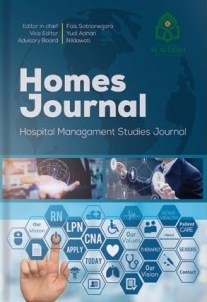THE DETERMINANT EFFECT OF HEALTH BPJS FEE PAYMENT ON FEE COMPLIANCE OF INDEPENDENT JKN PARTICIPANTS
Abstract
Background: JKN (National Health Insurance) is one of the government's efforts to improve public health status by requiring all Indonesians to become JKN members.
Objective:This research aims to determine whether the determinant factor of fee payments has an effect on the compliance of Independent JKN participants in paying the fees.
Method: A quantitative research with an analytic-observational approach and a cross-sectional research design. The population in this study was all the Independent JKN participants in Biringkanya sub-district, Makassar. The samples in this study were 52 families that were selected by using accidental sampling technique and the data collection method was carried out by using an online questionnaire via Google form.
Result: The results of this study indicate there is an effect of the respondent's income (0.001), increase in contributions (0.005), the deadline for payment of contributions (0.011) on the compliance of JKN Mandiri participants in paying BPJS Health contributions, and there is no effect of education (0.723), employment (0.138) and contribution payment procedures (0.656) to the compliance of JKN Mandiri participants to pay BPJS Health contributions in the Biringkanaya sub-district, Makassar City in 2020.
Conclusion:Adjusting the amount of fees, adding time limits and in-depth socialization to the community are some alternatives that can be used by providers, in this case by Health BPJS in increasing compliance to pay Health BPJS fees.References
BPJS Kesehatan. (2019). Data Peserta BPJS Kesehatan. Makassar.
Fadly F, Vianny O. (2019). Pemanfaatan Jaminan Kesehatan Nasional (JKN) Tahun 2018 di Provinsi Riau. Jurnal Kebijakan Kesehatan Indonesia: JKKI, 8 (4), 164 – 167.
Intiasari, A. D., Trisnantoro, L., & Hendrartini, J. (2015). Potret Masyarakat Sektor Informal di Indonesia: Mengenal Determinan Probabilitas Keikutsertaan Jaminan Kesehatan sebagai Upaya Perluasan Kepesertaan pada Skema Non PBI Mandiri. Jurnal Kebijakan Kesehatan Indonesia: JKKI, 4(4), 126-132.
Jhonson, J. (2017). Comparative Health System: A Global Perspective. Burlington, US. Executive Publisher. ISBN: 9781284111736.
Kemenkes RI. (2018). Profil Kesehatan Indonesia 2018. Jakarta : Pusat Data dan Informasi Kementerian Kesehatan Republik Indonesia.
Kusumaningrum, A., & Azinar, M. (2018). Kepesertaan Masyarakat Dalam Jaminan Kesehatan Nasional Secara Mandiri. HIGEIA (Journal of Public Health Research and Development), 2(1), 149-160.
Mila, U. (2015). Faktor yang Berhubungan dengan Kepatuhan Peserta Mandiri Kelas III Membayar Iuran Jaminan Kesehatan Nasional di Kota Solok Tahun 2015. Fakultas Kesehatan Masyarakat, Universitas Andalas.
Pangestika, V. F., Jati, S. P., & Sriatmi, A. (2017). Faktor–Faktor yang Berhubungan dengan Kepesertaan Sektor Informal dalam Bpjs Kesehatan Mandiri di Kelurahan Poncol, Kecamatan Pekalongan Timur, Kota Pekalongan. Jurnal Kesehatan Masyarakat (e-Journal), 5(3), 39-48.
Prasetyo, B. (2016). Faktor-faktor yang berhubungan dengan kepesertaan badan penyelenggara jaminan sosial kesehatan mandiri pada masyarakat Kelurahan Tanjung Puri tahun 2015. Jurnal Ilmiah Ilmu Kesehatan: Wawasan Kesehatan, 3(1), 81-89.
Priyoto. (2014). Teori Sikap & Perilaku dalam Kesehatan. Yogyakarta: Nuha Medika.
Saputra M, Marlinae L, Rahman F, Rosadi D. (2015). Program Jaminan Kesehatan Nasional dari aspek Sumber Daya Manusia Pelaksana Pelayanan Kesehatan. KEMAS Jurnal Kesehatan Masyarakat 2015; 11(1): 32-42.
Situmorang H C. (2016). Kesinambungan PendanaanJKN–BPJS Kesehatan. Jurnal Farmasi Indonesia, 8 (1).https://doi.org/10.35617/JFI.V8I1.418
S, S., Shaluhiyah, Z., & Patriajati, S. (2016). Analisis Faktor-Faktor yang Berpengaruh Terhadap Kemauan Masyarakat Menjadi Peserta JPKM Mandiri di Wilayah Kota Salatiga. Jurnal Promosi Kesehatan Indonesia, 9 (1), 90-103. doi: 10.14710/jpki.9.1.90-103.
Suhanda R. (2015). Jaminan Kesehatan dan Managed Care. Jurnal Kedokteran Syiah Kuala 2015; 15(2): 104-113.
Suprianti A. (2017). Evaluasi Pelaksanaan Jaminan Kesehatan Nasional. Journal Of Governance and Public Policy, 4 (1).https://doi.org/10.18196/jgpp.4172
Wardana, Bayu K., and Suharto Suharto.(2017). Hubungan Pendidikan Dan Pengetahuan Peserta BPJS DiKelurahan Rowosari Dengan Pemanfaatan Pelayanan Kesehatan Di Puskesmas Rowosari.Jurnal Kedokteran Diponegoro, 6 (1), 46-53.
Witcahyo E. (2016). Kesiapan dan persepsi masyarakat Kabupaten Bondowoso terhadap kebijakan Jaminan Kesehatan Nasional. Jurnal Pustaka Kesehatan 2016; 4(1): 188-195.
Yandrizal, Y., & Utami, S. P. (2017). Analisis kemampuan dan kemauan membayar iuran terhadap pencapaian UHC JKN di Kota Bengkulu. Jurnal Kesehatan Masyarakat Andalas, 10(1), 3-10.
Yolanda D.R. (2020). Sistem pelayanan administrasi penerimaan pasien pada Rumah Sakit umum daerah. Al-Sihah: Public Health Science Journal, 12 (1).


